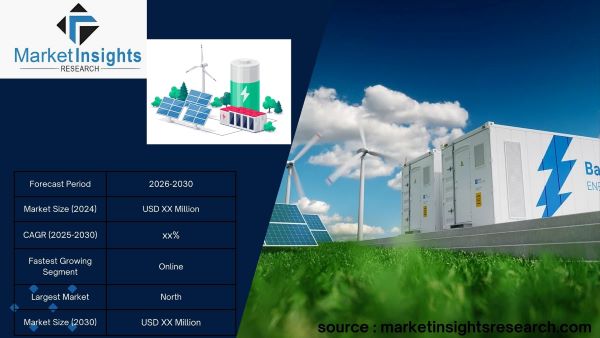| Forecast Period | 2024-2028 |
| Market Size (2022) | USD 425.44 Million |
| CAGR (2023-2028) | 6.04% |
| Fastest Growing Segment | Advanced Lead-Acid Batteries |
| Largest Market | Noth-West Germany |

Market Overview
Germany Battery Energy Storage Systems Market was valued at USD 425.44 million in 2022 and is anticipated to project robust growth in the forecast period with a CAGR of 6.04% through 2028. Battery Energy Storage Systems (BESS) refer to advanced technology setups that store electrical energy in rechargeable batteries for later use. These systems play a crucial role in modern energy management by storing excess electricity generated during low-demand periods, such as from renewable sources like solar or wind, and releasing it during high-demand periods or when renewable generation is low. BESS help stabilize and enhance the reliability of power grids by providing rapid response to fluctuations in supply and demand. They contribute to load balancing, frequency regulation, and mitigating voltage irregularities. BESS are versatile and can be deployed at various scales, from residential setups to large utility-scale installations. Their increasing adoption is driven by the growing need for sustainable energy solutions, grid resilience, and integration of intermittent renewable resources into the energy mix.
Key Market Drivers
In the realm of Battery Energy Storage Systems (BESS), Germany stands as a frontrunner driven by a confluence of influential factors that have catalyzed the market's growth and significance. These drivers, rooted in the nation's commitment to sustainable energy transformation and grid optimization, shape the landscape of BESS adoption in Germany.
Energiewende and Renewable Integration
Grid Stability and Flexibility

Market Participation and Ancillary Services
Climate Objectives and Emissions Reduction
Technological Advancements
Policy Support and Regulatory Framework

Energy Security and Resilience
Technological Leadership and Innovation Hubs
In conclusion, the Battery Energy Storage Systems market in Germany thrives on a multitude of drivers that mirror the nation's overarching energy vision. From renewable integration and grid stability to climate ambitions and policy support, these drivers converge to shape a dynamic landscape wherein BESS emerge as pivotal enablers of Germany's sustainable energy transformation.
Key Market Challenges
In Germany, while Battery Energy Storage Systems (BESS) hold immense potential to revolutionize the energy landscape, their widespread adoption and integration are accompanied by several noteworthy challenges.
Regulatory Complexity
Lack of Standardization
Permitting and Siting
Investment and Financing
Grid Connection and Infrastructure
Technological Evolution
Resource Availability
Project Sizing and Optimization
Public Acceptance and Awareness
Interplay with Market Mechanisms
Addressing these challenges requires a concerted effort from policymakers, regulators, industry stakeholders, and technology innovators. Clear and supportive regulatory frameworks, standardized guidelines, streamlined permitting processes, innovative financing models, and public engagement campaigns are essential to overcome these obstacles and unlock the full potential of Battery Energy Storage Systems in Germany’s transition to a sustainable and resilient energy future.
Segmental Insights
Battery Type
The Lithium-Ion Battery segment established its dominance in the battery energy storage systems market in 2022 and is projected to maintain this position throughout the forecast period. Germany's research and innovation ecosystem bolsters advancements in Li-ion battery technology. Research institutes, academia, and industry collaborations drive improvements in energy density, cycle life, and safety, enhancing the overall value proposition of Li-ion-based BESS.
Application Insights
Regional Insights
The North-East Germany region is the most developed market for BESS in Germany. This is due to the high concentration of industry and population in this region. The Central Germany region is also a developed market for BESS, due to the growing demand for renewable energy and the need for grid balancing in this region. The South Germany region is an emerging market for BESS, due to the increasing investment in renewable energy in this region. The East Germany region is the least developed market for BESS in Germany, due to the limited demand for BESS in this region.
Recent Developments
- In November 2022RWE announced its plans to
install 220 MW of battery storage capacity at two decommissioned lignite-fired
and coal-fired power plants in North Rhine-Westphalia, Germany, for around USD
147 million. The construction of this project is scheduled to start in 2023,
and commissioning is planned for 2024.
- In October 2022Fluence Energy GmbH and
TransnetBW GmbH announced the deployment of the world’s largest battery-based
energy storage-as-transmission project. Fluence Energy GmbH is a leading
company in energy storage products and services, and TransnetBW GmbH is
Germany's leading transmission system operator. With this project, both
companies aim to improve energy security and significantly support Germany’s
energy transition pathway by increasing the efficiency of the existing grid
infrastructure.
Key Market Players
·
·
·
·
·
·
·
·
·
|
By Battery Type
|
By Energy Capacity
|
By Application
|
By Connection
Type
|
By Region
|
- Lithium-Ion
Batteries
- Advanced
Lead-Acid Batteries
- Flow
Batteries
- Others
|
- Above 500
MWh
- Between 100
to 500 MWh
- Below 100
MWh
|
- Utility
- Commercial
- Residential
|
|
- North-West
- North-East
- South-West
- South-East
|



